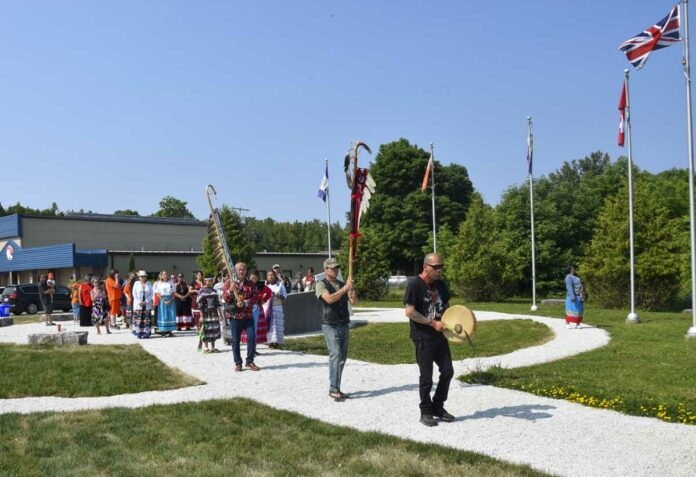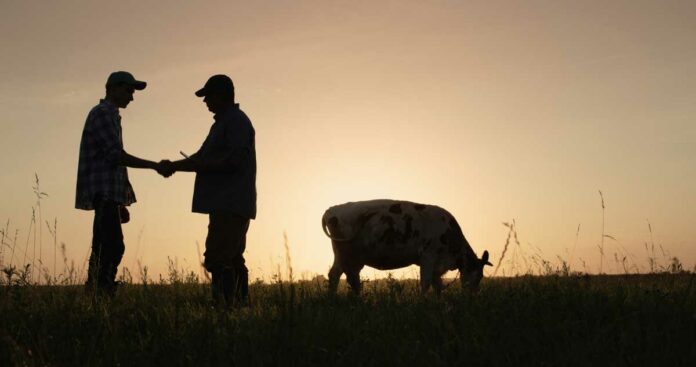by Margery Frisch
MNIDOO MNISING—The Robinson-Huron Treaty, signed in 1850, committed to giving First Nations groups annual payments based on the revenues accrued through the use of their lands. The annuity, approximately $1.70 per person in 1850, increased to $4 per person in 1875 and that was the one and only increase in the annual fee in 173 years. The treaty had promised to tie the value of annual payments to the revenues generated through the use of First Nations’ lands. Meanwhile, Northeastern Ontario mining, fishing and lumber industries have benefitted in the billions of dollars over the past two centuries and no compensation has occurred. For decades, delegations from 21 First Nations have been in litigation with both the federal and provincial governments for breaking their treaty obligations. Since April 2022, these groups have been working together to come to an out-of-court agreement on how to rectify the outstanding debt to the First Nations people
On Saturday, June 17 a proposed settlement was announced between the federal government, the Ontario government and 21 Anishinabe First Nations communities. A $10 billion figure has been reached to compensate for annuities that have not been amended since 1874. The three parties made the announcement at a press conference in Sudbury. The federal and provincial governments will share the cost, $5 billion paid by each.
“In 2012, 21 First Nations in the Robinson Huron Treaty Territory came together to hold the governments of Canada and Ontario accountable through the courts, but we know reconciliation cannot be achieved in the courtroom. Canada and Ontario heard us and met us at the negotiation table to make this proposed settlement a reality,” said spokesperson Duke Peltier of Wiikwemkoong Unceded Territory.
Terry Debassige, a soft-spoken M’Chigeeng First Nation member, with a passion for his people’s history, had some strong words about the Canadian government and its promises. He was asked his thoughts on the settlement of $10 billion. “To a lot of us, that doesn’t even come close to what is owed,” he said. “I mean, I could give you a dozen names of people who are ecstatic over this, but really, it’s a drop in the bucket.”
Community engagement comes next in the process; consultations with First Nations members. When asked how he thought these consultations would go, Mr. Debassige said, “It’s going to be very difficult, contentious and long. There are residual impacts, a lot of people were Robinson-Huron Treaty people and should be entitled, though, through different circumstance, may have lost their rights to this for any number of reasons.”
“The compensation from this settlement will ensure a stronger and brighter future for our people and our nations,” said Batchewana First Nation Chief Dean Sayers, one of the leaders of the RHT Litigation Fund. “We see this settlement as an opportunity to show the commitment of both Canada and Ontario to respect and implement our rights affirmed in the treaty,” he said.
Mr. Debassige was asked if he thought this settlement will ensure a stronger and brighter future, “It would go a long way,” he said. “Of course, if they had honoured the treaty all along, we’d be in far better shape.”
Mr. Debassige’s memory is exceptional and it goes way back. He knows the ways of his people and what was taken away and admits to being bitter and mistrusting where the government is concerned. In conversation, he lists names of endless broken treaties and it’s easy to understand his misgivings.
“I pray in the ceremonial way of my grandmother. Of course, it all had to be done in secret back then. But that philosophical view guided every aspect of life; everything that represented their existence was in those spiritual beliefs (I don’t even know if spiritual is the right word). I always tell people that our constitution is already written, it’s in our language. It’s all embedded in the words we use. That sacredness; that benevolent power; you’re always in a state of gratefulness.”
Others, who did not wish to be named, feel that this settlement is a positive step forward in reconciliation and in making Canadians aware of this history. Making others aware is always a positive step, and, although Mr. Debassige is skeptical, he has a grateful heart and he will wait to see what happens next.

photo by Margery Frisch





